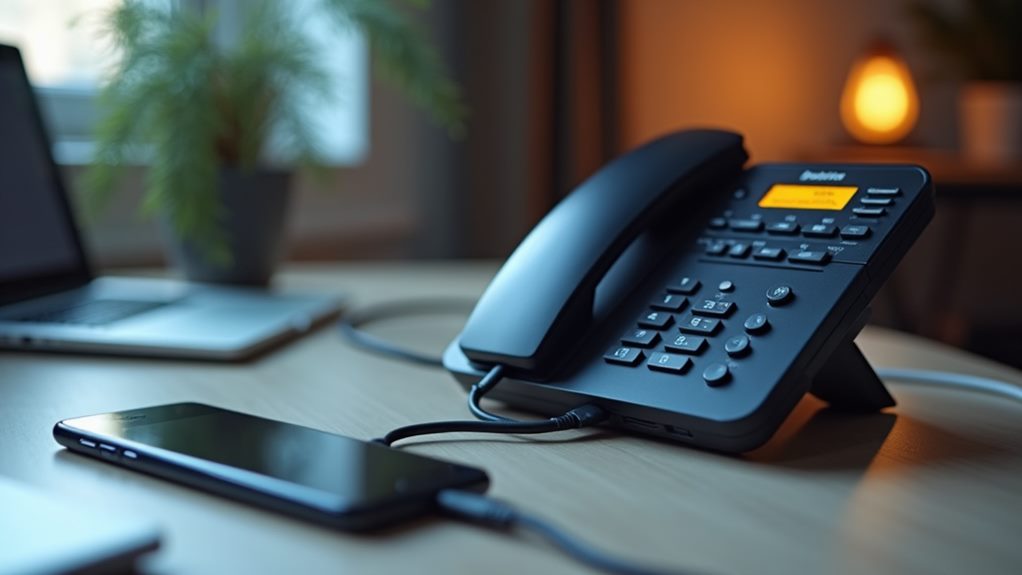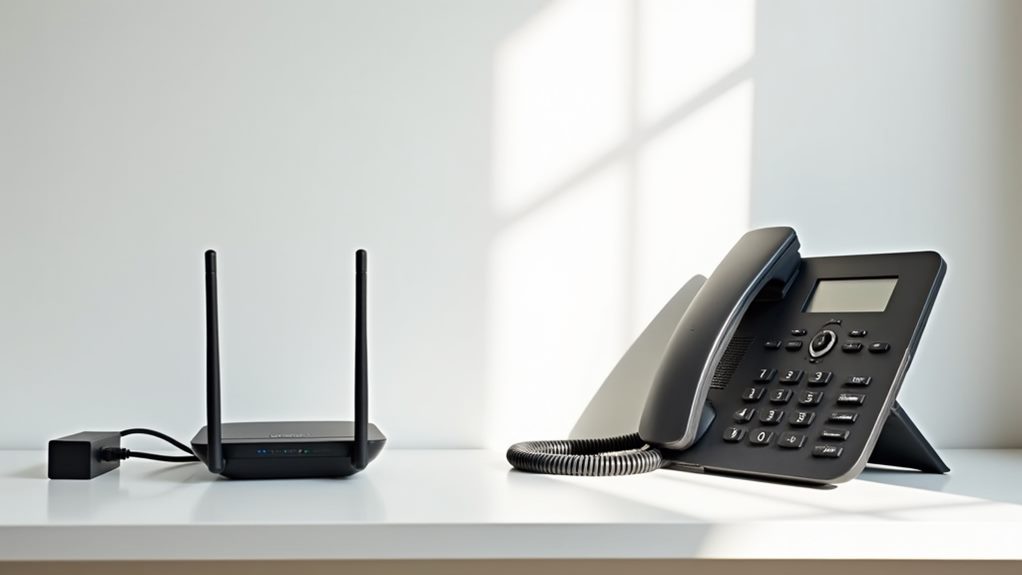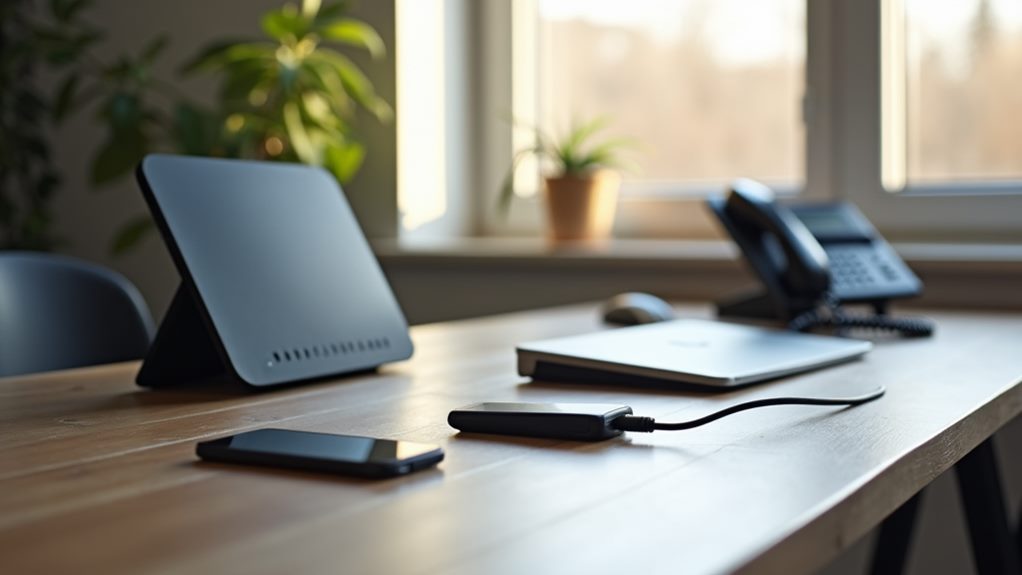You don't need a landline if you have VoIP since it operates independently through your internet connection rather than traditional phone lines. VoIP converts your voice into digital data packets and transmits them via broadband, allowing you to make calls from smartphones, computers, or VoIP phones. You'll need a reliable internet connection with at least 20Mbps download speed and appropriate VoIP-compatible devices or adapters. While VoIP offers significant cost savings and advanced features like video conferencing, you should consider having a backup solution for emergencies since VoIP requires both power and internet to function. Understanding the full scope of VoIP capabilities will help you make an informed change decision.
Understanding VoIP Phone Systems

Modern communication technology has revolutionized how we make phone calls through Voice over Internet Protocol (VoIP) systems. Unlike traditional landline phones that rely on copper wires, VoIP phone systems operate entirely through your broadband connection, transforming your voice into digital data packets that travel across the internet. This method of transmission offers considerably greater cost savings compared to traditional phone systems, making it a popular choice for many users considerable cost savings.
When you're considering whether you need a landline with your VoIP service, it's important to understand that VoIP operates independently of traditional phone infrastructure. You can access VoIP services through various devices you likely already own, including your smartphone, tablet, or computer. This flexibility means you're not tethered to a specific location or physical phone line to make calls.
VoIP phone systems offer enhanced capabilities that surpass traditional landline features. You'll have access to video conferencing, automated call forwarding, and advanced voicemail options.
While you don't need a landline to use VoIP services, some users maintain one as a backup communication method during internet outages. Your decision might depend on your area's internet reliability and your specific communication needs.
Traditional Landlines Versus VoIP Technology
Understanding the key differences between traditional landlines and VoIP technology helps clarify why you don't need a landline for VoIP service. While traditional landlines transmit voice through analog signals over physical copper wires, VoIP converts your voice into digital data packets that travel through your broadband internet connection.
VoIP isn't only a cost-effective solution for communication but also offers advanced features that enhance connectivity and productivity. The benefits of VoIP extend beyond basic phone calls. You'll gain access to advanced features like video conferencing and sophisticated call forwarding, which aren't typically available with traditional landline services. Additionally, you'll notice significant cost savings when switching to VoIP, particularly for long-distance communications, as the operational costs are lower and many features come bundled together.
However, you should consider certain factors before completely abandoning your traditional landline. VoIP requires a stable internet connection and power supply to function. During outages or internet disruptions, your VoIP service won't work unless you have backup systems in place.
While traditional landlines remain operational during power failures, VoIP systems depend on electricity and internet connectivity. For emergency services and areas with unreliable internet, maintaining a backup landline alongside your VoIP system might be prudent.
Required Equipment for VoIP Setup

While traditional landlines require extensive physical infrastructure, setting up a VoIP system demands only a few essential components.
You'll need to start with a reliable broadband internet connection that can support calls over the internet, with speeds of at least 20Mbps to guarantee clear communication without disruptions. VoIP technology utilizes advanced features that enhance user experience compared to standard phone systems.
Your next requirement is a VoIP phone or compatible device. You can choose from various options, including smartphones, tablets, or computers equipped with VoIP software.
If you're attached to your traditional landline phones, don't worry – you can still use them by connecting a VoIP adapter, which converts analog signals to digital data for internet transmission.
To complete your setup, you'll need to take into account additional equipment based on your specific needs. A router capable of handling VoIP traffic is essential for managing your calls effectively.
If you're using a computer for communications, you might want to invest in a quality headset for better audio clarity.
Internet Speed and Connectivity Requirements
Your VoIP system requires a minimum download speed of 20Mbps to maintain clear, reliable call quality and prevent disruptions during conversations.
You'll need to assess your current bandwidth usage to guarantee your internet connection can handle VoIP calls alongside other online activities.
You should conduct a speed test at peak usage times to verify your network meets these requirements, especially if you plan to support multiple simultaneous VoIP calls.
Minimum Speed For VoIP
Reliable VoIP service depends on meeting specific internet speed requirements, with a minimum download speed of 20Mbps needed for clear voice transmission. When you're considering replacing your traditional landline with VoIP, it's essential to evaluate your current internet connection to guarantee it meets these specifications.
Your internet speed directly impacts your VoIP call quality. If you're experiencing choppy audio or dropped calls, it's likely due to insufficient bandwidth. Unlike traditional landlines, VoIP technology relies entirely on your high-speed broadband connection to transmit voice data.
You'll need to maintain consistent speeds above the minimum threshold, especially if you plan to make multiple simultaneous calls.
To maximize your VoIP performance, you should implement proper bandwidth management strategies. This includes monitoring your internet usage during calls and potentially upgrading your service if needed.
You can run speed tests to verify that your connection meets the 20Mbps requirement. Remember that other online activities running concurrently with your VoIP calls will require additional bandwidth, so factor this into your calculations when determining if your current internet speed is sufficient.
Bandwidth Usage Assessment
Proper bandwidth assessment forms the cornerstone of successful VoIP implementation, requiring careful evaluation of your internet connection's capabilities and limitations.
You'll need a stable broadband connection with at least 20Mbps download speed to guarantee reliable call quality. When you're shifting from a traditional landline to VoIP, understanding your bandwidth usage becomes vital, especially if you're managing multiple simultaneous calls.
Before making the change, consider these essential bandwidth factors:
- Each VoIP call consumes between 64kbps to 128kbps of bandwidth, varying based on your chosen codec
- Remote working scenarios require additional bandwidth allocation for uninterrupted communication
- Multiple concurrent calls can strain your internet connection, potentially affecting overall performance
- Latency and jitter measurements must fall within acceptable ranges for peak call quality
To accurately assess your bandwidth requirements, conduct thorough speed tests during peak usage hours.
This evaluation helps determine if your current internet speed can handle your anticipated call volume. Remember that VoIP's efficiency depends heavily on your connection's stability and speed, making regular bandwidth monitoring essential for maintaining professional communication standards.
Emergency Services and Power Outages

During power outages and emergencies, VoIP systems present unique challenges that traditional landlines don't face. Without a stable internet connection, you'll find yourself unable to make calls, including potentially critical emergency services contacts.
Unlike conventional landlines that remain operational during blackouts, your VoIP service depends entirely on power and internet connectivity.
To protect yourself against these vulnerabilities, you'll need to contemplate implementing battery backup solutions for your VoIP devices. This precautionary measure guarantees uninterrupted communication during brief power outages, keeping you connected when it matters most.
If you have health or safety concerns, maintaining a traditional landline as a backup communication method might be a prudent decision.
You'll want to regularly test your VoIP system's emergency service capabilities to understand its limitations. Make sure you're familiar with how your system performs during power disruptions and verify that your battery backup solutions function as intended.
Many VoIP providers now offer specific guidance on emergency preparedness, and following their recommendations helps guarantee you'll stay connected during critical situations.
Cost Comparison and Business Benefits
When comparing communication costs, VoIP systems consistently outperform traditional landlines by delivering substantial savings across multiple metrics. Your business phone system expenses decrease considerably when you eliminate line rental fees and benefit from reduced rates on international calls.
With VoIP, you'll gain access to premium features that traditional telephone systems typically charge extra for, including 5,000 free UK minutes in many packages.
- Your team can conduct video conferences from anywhere with internet access
- You'll receive voicemails directly in your email inbox, enhancing productivity
- Your calls can follow you across devices with intelligent call forwarding
- You're able to scale your system up or down without hardware limitations
The cost comparison becomes even more compelling when considering the 2025 ISDN shutdown. By shifting to VoIP now, you're not just saving on current communication costs – you're investing in a future-proof solution.
The business benefits extend beyond direct savings, as VoIP's advanced features streamline your operations and enhance team collaboration. Your organization joins the growing community of forward-thinking businesses that have already recognized VoIP's superior value proposition over traditional landline infrastructure.
Making the Switch to VoIP

Three key steps mark a successful change to VoIP service: evaluating your internet infrastructure, selecting compatible hardware, and maintaining your existing phone numbers.
Before you disconnect your traditional landline, you'll need to verify that your broadband internet connection meets the minimum requirements for VoIP performance, which includes at least 20Mbps download speed.
When you're ready to shift from traditional phone systems, you'll first need to assess your hardware needs. You can either purchase VoIP-compatible devices or use adapters with your current phones, making the switch more cost-effective.
Don't worry about losing your familiar phone numbers – you can transfer them to your new VoIP service, ensuring your contacts can still reach you at the same number they've always used.
After setting up your VoIP equipment and porting your numbers, you'll want to conduct thorough testing of all phone services. This includes checking call quality, testing various features, and ensuring your system performs reliably across different scenarios.
Once you've confirmed everything works properly, you can confidently complete your change away from your traditional landline.
Final Thoughts
VoIP technology has made traditional landlines increasingly obsolete, with 76% of businesses now utilizing VoIP systems as their primary communication method. You don't need a landline if you have VoIP, provided your internet connection meets minimum bandwidth requirements (100 kbps per line) and you've implemented backup power solutions. The key factors in your decision should be internet reliability, emergency service requirements, and cost-efficiency goals.

